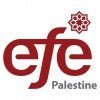Consultant
الوصف الوظيفي
لقد انتهت صلاحية هذه الوظيفة في 2014-12-01
تصفح أحدث الوظائف
عند التقدم لاية وظيفة عن طريق الانترنت، لا تقم بإعطاء معلومات بطاقة الأعتماد او أية معلومات بنكية / مالية لصاحب عمل. نصيحة من جوبس لحمايتك :
آخر الوظائف المعلنة بواسطة
Humanity & Inclusion Palestine
المسمى الوظيفي
تاريخ النشر
Physiotherapist
قطاع غزة
5, Jul
Rehabilitation Officer
قطاع غزة
4, Jul
MDR Supervisor
قطاع غزة
4, Jul
Psycho-Social Worker
قطاع غزة
1, Jul
Psychologist
قطاع غزة
1, Jul
Atlas Project Manager
قطاع غزة
30, Jun
Humanitarian Access & Security Officer
قطاع غزة
20, May
Procurement & Facility Supervisor
قطاع غزة
15, May









